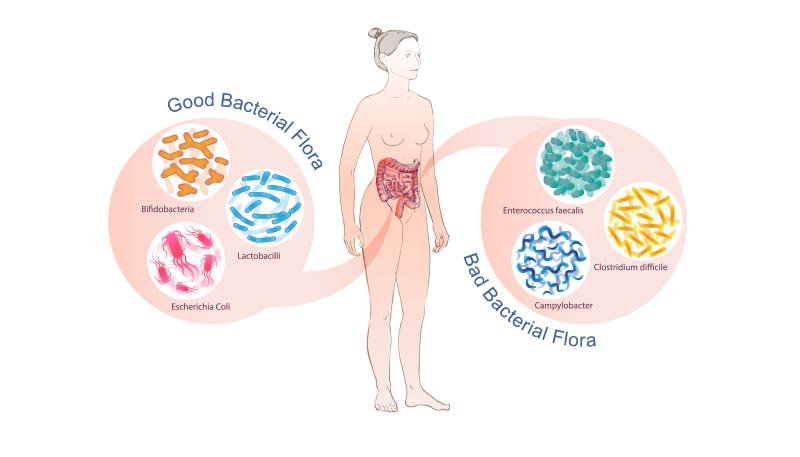Microbiota Or Gut Flora

Human gastrointestinal microbiota, also known as gut flora or gut microbiota, are the microorganisms (generally bacteria and archaea), that live in the human digestive tracts.
Our gut microbiota contains tens of trillions of microorganisms, including at least 1000 different species of known bacteria with more than 3 million genes (150 times more than human genes).
Microbiota can, in total, weigh up to 2 kg. One third of our gut microbiota is common to most people, while two thirds are specific to each one of us. In other words, the microbiota in our intestine has an individual identity.
As its name states, gut microbiota is harboured in the intestine, one of the main areas in our bodies that comes into contact with the external environment (other examples are the skin and the lungs).

The gut microbiota of each individual is unique. It contributes to how a person fights diseases, digests food, and processes psychological events and emotions.
- 1 It helps the body to digest certain foods that the stomach and small intestines are incapable to digest.
- 2 It helps with the production of vitamins B and K.
- 3 It helps us combat aggressions from other microorganisms, while maintaining the united structure of the intestinal mucosa.
- 4 It plays an important role in protecting the immune system, performing a barrier effect.
- 5 A healthy and balanced gut microbiota is the key to ensuring proper digestive functions.
- 6 Gut bacteria helps our organs break down complex molecules found in meats and vegetables. Without the aid of gut bacteria, plant cellulose is indigestible.
- 7 The microbiota can affect the brain, which is also involved in digestion. The gut microbiota is also called the “second brain.”
- 8 It is also responsible for our gut’s conditions, including inflammatory bowel diseases (IBD), such as Crohn’s disease and ulcerative colitis, as well as obesity and type 2 diabetes.
The gut microbiota of each individual is unique. It contributes to how a person fights diseases, digests food, and processes psychological events and emotions.
- 1 It helps the body to digest certain foods that the stomach and small intestines are incapable to digest.
- 2 Increase your fibre intake – whole grains, brown rice, bran, oatmeal etc.
- 3 Eat as many types of fruit and veg as possible, and try to eat seasonally grown fruits
- 4 Pick high-fibre vegetables like beans, beetroot, cabbage, pumpkin, cauliflower etc.
- 5 Choose food and drinks with high levels of polyphenols
- 6 Avoid snacking on preserved and packaged foods
- 7 Eat plenty of fermented foods containing live microbe
- 8 Include foods rich in probiotics and prebiotics